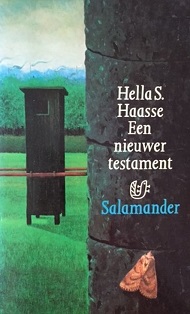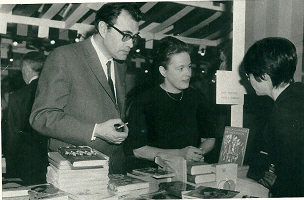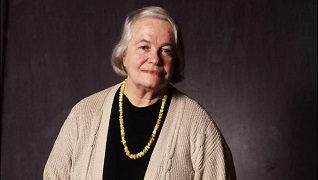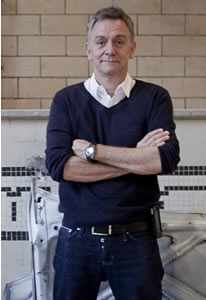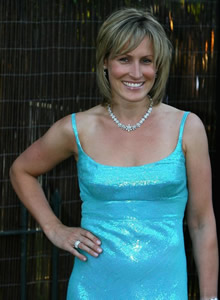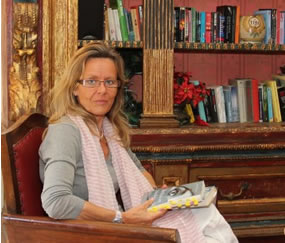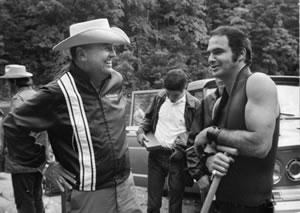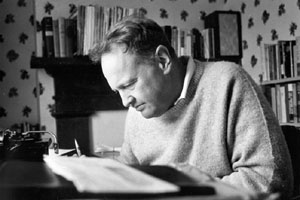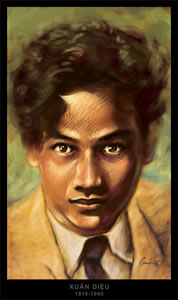De Nederlandse schrijfster Hella Haasse werd geboren op 2 februari 1918 in Batavia. Zie ook alle tags voor Hella Haasse op dit blog.
Uit: Transit
“Zwarte wollen leggings had ze aan, zwarte rijglaarzen, en over een zwarte trui die tot op haar heupen hing een kort jack van zwart kunstleer. Een scheur in de linkermouw was met zwart gemaakte pleister dichtgeplakt. Haar haren droeg ze kortgeknipt, een donkerblonde kap. Heel haar aardse bezit zat samengeperst in een klein model rugzak. Ze had juist haar gezicht gewassen en haar tanden gepoetst in de wc op het eerste perron. In de nissen, gevormd door de muur van het hoofdgebouw en de uitspringende metalen ribben van de overkapping, zaten en lagen een paar, meest jonge, reizigers te wachten op vroege internationale treinen. Ook zij had geld noch onderdak. Ze was niet meer op reis, maar evenmin thuisgekomen. Ze woonde nergens.
Sinds ze was gaan zwerven bekeek ze stations met andere ogen. In hoeveel van die gewelven van vuil glas, waar altijd schemer heerste, was ze al geweest? Stations om er te slapen, zich te warmen in wachtkamers, om er schuilgaand in de menigte de tijd door te brengen – zelden om er als treinreiziger te vertrekken of aan te komen; liften was onvergelijkbaar veel goedkoper. Overal dezelfde perrons en trappen, dezelfde evenwijdige of in elkaar verglijdende treinsporen, dezelfde geluiden en echo’s; alleen de opschriften verschilden in taal en lettersoort. Hier, terug in eigen land, herkende ze de witte pictogrammen op donkerblauwe ondergrond, de heldergroene telefooncellen, de gele treinen, en ze verstond het geroezemoes. Maar dat bekende veroorzaakte juist een gevoel van vervreemding.
De kiosken en winkels in de brede gang onder het station waren al open. De geur van de croissanterie maakte haar haast misselijk. In de hal treuzelde ze. De toiletten hadden haar vijftig cent gekost. Starend naar het vloermozaïek van bruine, blauwe en zwarte blokjes rekende ze uit hoeveel ze nog te besteden had. De automobilist met wie ze voor het laatste gedeelte van haar tocht was meegereden, had haar afgezet bij een tramhalte aan de stadsgrens. Vandaar naar Centraal was de rit gratis geweest; ze had een van de straat opgeraapte gebruikte strippenkaart in de stempelautomaat gestoken om de vereiste klik te produceren. Maar dat zou de trambestuurder een zorg zijn.
Ze keek op de grote klok. Het was even over negen. Ze rekende erop dat de vriendin bij wie ze ging aankloppen thuis was, om uit te slapen. Na het weerzien zouden ze samen ontbijten met verse koffie en geroosterd brood, zoals vroeger.
Ze zag hem zodra ze buitenkwam. Eerst kon ze niet geloven dat hij het was. Haar ongeloof gold niet het toeval (hoe wonderlijk het ook was dat ze hem, juist hem, hier aantrof, op het stationsplein bij de blauwe paal met de klok) maar de toestand waarin ze hem vond. Ze liep naar hem toe, tot vlak bij hem; ze had zich niet vergist. Ze noemde hem bij zijn naam. Hij reageerde niet, bleef onbeweeglijk staan, hield zijn hoofd wat achterover alsof hij keek naar iets in de lucht of op het dak van het stationsgebouw. Maar zijn blik was leeg, ongericht.”
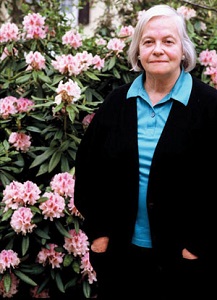
Hella Haasse (2 februari 1918 – 29 september 2011)
De Nederlandse dichter en schrijver Willem van Zadelhoff werd geboren in Arnhem op 2 februari 1958. Zie ook alle tags voor Willem van Zadelhoff op dit blog.
5 Manieren om een stad te zien
1
wij zijn hier niet gekomen om een brug te zien
hier wordt niets verbonden daarom
want wat niets met elkaar te maken heeft
moet van elkaar afblijven duidelijk
stil water en verder geen enkele boot
geen gras om op te liggen geen oneindigheid
geen vrouw zelfs geen matras om God te prijzen
hoogstens een dek vol dofklinkend hout kromhout
gewoon de brug negeren en voor je uitkijken
strak voor je uitkijken en zo min mogelijk waarnemen
je geen strobreed in de weg laten leggen en vooral
geen mist van geluiden en geuren optrekken want
niets zijn niets geweest zijn en nooit iets worden dat besef je
en dat geen hand jou zal bewaren geen vinger geen nagel
Tussen taal en teken
een cyclus
1
haar schouder vangt het laatste licht
de pen trekt lijn na lijn op papier cirkels
nu is wat was en ontbreekt het
voorgoed aan herinneringen
niets hoeft meer gestold in inkt
misschien een schaduw op de vloer
bijvoorbeeld de vragende blik op haar gezicht
dat nerveuze trekken van haar mond
wat was is tijd geleden is het lijden
van tijd is uur minuut en seconde
dan steekt een wind op en blaast
papier en bladeren voor zich uit
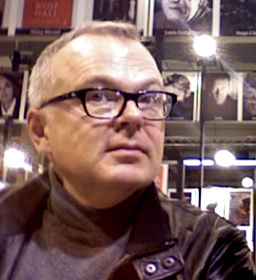
Willem van Zadelhoff (Arnhem, 2 februari 1958)
De Nederlandse schrijfster Esther Gerritsen werd op 2 februari 1972 geboren in Nijmegen. Zie ook ook alle tags voor Esther Gerritsen op dit blog.
Uit: De trooster
“Ik herinner me dat ik de deurposten schuurde, dat ik spierpijn had, mijn vingers kapot waren, dat ik het hout blanker en gladder zag worden en ik zeker wist dat ik gelukkig was. Het werk onder je handen zien verbeteren. Het hout en ik, dat was genoeg. Ik was tevreden met mijn gebrekkige lichaam, dat brandt en slijt en toch volstaat, dat doet wat het moet doen. Ik verlangde niets.
Ik ging zitten en keek naar mijn werk. De stilte was weldadig en onmiddellijk was er de wens om hier voor altijd te kunnen blijven zitten. Ik lachte omdat ik net nog dacht niets te willen. Elk vredig ogenblik roept het ongedurige verlangen op om het te verlengen. Steeds weer: en zo moet het blijven.
Op dat moment kwam Henry Loman binnen. Zo op het eerste gezicht een vermoeide man van middelbare leeftijd met overgewicht. Soms probeer ik mijn eerste blik op hem terug te halen, mijn snelle, weinig vleiende oordeel. Dat lukt me nauwelijks.
De gastvrouw was tulpen halen in het dorp, blijkbaar verwachtte zij nu nog niemand. Omdat hij een koff er bij zich had, begreep ik dat het een retraitegast moest zijn die veel te vroeg arriveerde. Hij stak meteen zijn hand uit, stelde zich voor, ik luisterde niet. Ik keek in een reflex nog om me heen of er niet iemand anders was om hem te ontvangen, terwijl ik wist dat ik alleen was. De broeders maakten zich net klaar voor de vespers; ik durfde hen niet te storen, het was aan mij om de gast te verwelkomen. Ik ben het gewend mezelf onmisbaar te maken met het aanpakken van allerhande klussen, maar zelden zijn ze sociaal van aard. Ik zeg eigenlijk altijd ja. Heggen snoeien, een terras aanleggen, de gevel schilderen, de moestuin onderhouden, een muurtje metselen.
Wanneer iemand vraagt: ‘Kun jij dat?’ zeg ik ‘ja’, en denk: hoe moeilijk kan het zijn? Nooit vraagt iemand me om een gast te ontvangen. Ik ga ervan uit dat dit vanwege mijn scheve gezicht is, dat de mensen afschrikt of verwart. Nu zie ik het probleem niet in van een beetje verwarring, ik voel zeker niet de behoefte om daar zelf de oorzaak van te zijn.”
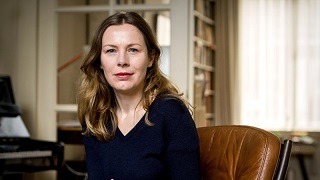
Esther Gerritsen (Nijmegen, 2 februari 1972)
De Nederlandse dichter, tekstschrijver en cabaretier Kees Torn werd geboren in Oostburg op 2 februari 1967. Zie ook alle tags voor Kees Torn op dit blog.
Ommetje
Er brandt al lang geen licht meer bij de buren
Als ik thuis kom is ’t stil op straat
De hele buurt slaapt om die tijd al uren
Niemand die nog bezig is, zo laat
Maar zelfs wanneer ik best een beetje moe ben
Van lange dagen en van slaap tekort
En aan een welverdiende nachtrust toe ben
Mij maakt ’t niet uit hoe laat ’t wordt
Al moet ik ’s morgens weer vroeg uit bed
Ik maak, voor ik m’n wekkertje zet
En geeuwend op m’n slaapbankje rol
Eerst een ommetje
Een ommetje met m’n mol
Een ommetje met m’n mol
Ik maak echt iedere nacht een ommetje met m’n mol
Terwijl ‘ie braaf wacht schep ik met de wormen
Die ik voor m’n molletje mee heb gebracht
Z’n kommetje lekker vol
Hij hoort ’t, als ik de trap kom opgelopen
En als ik dan de voordeur openmaak
Is hij allang z’n bloempot uitgekropen
En pakt ‘ie ’t riempje van de haak
Buiten rent ‘ie altijd eerst een stukje
En is ‘ie eenmaal lekker uitgedraaft
Passeert ‘ie altijd even, voor een drukje
Dat ‘ie keurig, meters diep begraaft
Als in de stad ieder drankhuis sluit
En binnen gaan alle lichten uit
En iedereen kruipt onder de wol
Maak ik een ommetje
Een ommetje met m’n mol
Een ommetje met m’n mol
Met dat gezellige beest, een ommetje met m’n mol
Vanavond is het weer feest
Vanavond dan steek ik, want hij is pas namelijk jarig geweest
Een blommetje in z’n hol

Kees Torn (Oostburg, 2 februari 1967)
De Ierse schrijver James Joyce werd geboren in Dublin op 2 februari 1882. Zie ook ook alle tags voor James Joyce op dit blog.
Uit: Ulysses
“— You were making tea, Stephen said, and I went across the landing to get more hot water. Your mother and some visitor came out of the drawing room. She asked you who was in your room.
— Yes? Buck Mulligan said. What did I say? I forget.
— You said, Stephen answered, O, it’s only Dedalus whose mother is beastly dead.
A flush which made him seem younger and more engaging rose to Buck Mulligan’s cheek.
— Did I say that? he asked. Well? What harm is that?
He shook his constraint from him nervously.
— And what is death, he asked, your mother’s or yours or my own?
You saw only your mother die. I see them pop off every day in the Mater and Richmond and cut up into tripes in the dissecting room. It’s a beastly thing and nothing else. It simply doesn’t matter. You wouldn’t kneel down to pray for your mother on her deathbed when she asked you. Why? Because you have the cursed jesuit strain in you, only it’s injected the wrong way. To me it’s all a mockery and beastly. Her cerebral lobes are not functioning. She calls the doctor Sir Peter Teazle and picks buttercups off the quilt. Humour her till it’s over. You crossed her last wish in death and yet you sulk with me because I don’t whinge like some hired mute from Lalouette’s. Absurd! I suppose I did say it. I didn’t mean to offend the memory of your mother.
He had spoken himself into boldness. Stephen, shielding the gaping wounds which the words had left in his heart, said very coldly:
— I am not thinking of the offence to my mother.
— Of what, then? Buck Mulligan asked.
— Of the offence to me, Stephen answered.
Buck Mulligan swung round on his heel.
— O, an impossible person! he exclaimed.
He walked off quickly round the parapet. Stephen stood at his post, gazing over the calm sea towards the headland. Sea and headland now grew dim.
Pulses were beating in his eyes, veiling their sight, and he felt the fever of his cheeks.
A voice within the tower called loudly:
— Are you up there, Mulligan?
— I’m coming, Buck Mulligan answered.
He turned towards Stephen and said:
— Look at the sea. What does it care about offences? Chuck Loyola, Kinch, and come on down. The Sassenach wants his morning rashers. “
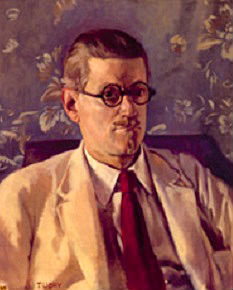
James Joyce (2 februari 1882 – 13 januari 1941)
Portret door Patrick Tuohy, 1924
De Vlaamse dichter en schrijver Eriek Verpale werd geboren op 2 februari 1952 te Zelzate. Zie ook alle tags voor Eriek Verpale op dit blog.
(Over) de nutteloosheid van het winnen
The winner takes it all, aldus Abba, maar die keer
toen ik bij een tombola in een toch wel zeer naar carboline
ruikende parochiezaal een gifgroene slazwierder
gewonnen had, olala, toen gooide mijn moeder
de gebruikelijke oude keukenhanddoek niet weg
maar verknipte hem tot zakdoeken, voor mij,
de altijd verkouden snotneus die zelfs boven
zijn pannekoeken triestig het water liet lopen.
Daarna won ik een boek, zoiets heette toen nog een prijsboek:
Het leven van Abraham Lincoln, waardoor ik na het lezen
van dat boek een tijdlang niets anders wilde worden dan
Eriek Verpale, president van Amerika én Israël,
hetgeen alleszins beter klonk dan Eriek Verpale,
kakt in de bale! jawel. Maar ik werd dus geen president,
zelfs niet van Gent, maar wél won ik de prijs harer poëzie
en in de feestzaal, tot verdriet mijner collega’s en hun eega’s:
echt vermoord werd ik niet.
Het mocht toen wel ophouden, vond ik, met al dat gewin
vol kattegespin, maar ziet, op het jaarlijkse bal van mijn communistische
doktoren viel ik alweer in de prijzen en won ik voor mijn haar
een gratis brushing zodat de mensen naar mij wel bléven
wijzen, want ik hád al zoveel minderjarige vriendinnetjes
voor wie ik zelfs vaak levend model stond, om op te oefenen
vooralswanneer zij ook dode mensen káál moesten leren scheren.
Godlof, een eind aan al dat gewin kwam er echter slechts dan
nadat ik, straatarm, zeer zwaar op de Lotto begon te spelen
en over de grens zelfs illegale casino’s bezocht waarna
ik, platzak, nog om een sigaret
moest bedelen.
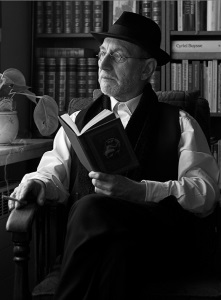
Eriek Verpale (2 februari 1952 – 10 augustus 2015)
De Britse schrijfster Santa Montefiore (eig. Santa Palmer-Tomkinson) werd geboren op 2 februari 1970 in Hampshire. Zie ook alle tags voor Santa Montefiore op dit blog.
Uit: Onder de Italiaanse zon (Vertaald door Erica Feberwee)
“Gracies blik bleef op de foto rusten. Het kasteel was precies zoals een Italiaans castello zou moeten zijn: fraai en evenwichtig van proportie, met kantelen op de muren, met hoge ramen voorzien van luiken en met daarboven halvemaanvormige timpanen. De hete zomerzon en de gure winterstormen hadden het zandsteen doen verbleken tot grijsgeel. Als een imposante oude vorst verhief het kasteel zich op de top van de heuvel, majestueus oprijzend boven de middeleeuwse huizen die zich als een woud van steen aan de voet van de heuvel hadden verzameld. Gracie sloot haar ogen, en terwijl ze diep inademde, rook ze de geur van wilde tijm en rozemarijn, van jasmijn en kamperfoelie, van uitbundig bloeiende gardenia, bedauwd gras en het harsachtige aroma van pijnbomen. In haar verbeelding hoorde ze het tjirpen van krekels en zag ze de fluweel-zwarte sterrenhemel die zich boven de Toscaanse heuvels spande, als een met diamanten bezaaide baldakijn. Haar hart stroomde over van verlangen, een verlangen dat lang had geslapen maar dat na vele jaren eindelijk weer ontwaakte. Het was een gevoel dat haar bang maakte, want ze wist zich er geen raad mee. Ze was vergeten wat ze ermee aan moest, net zoals ze was vergeten hoe het voelde om jong en verliefd te zijn, om de wereld dapper en avontuurlijk tegemoet te treden. De kunst van het leven, die was ze verleerd. Ze had zich tientallen jaren in haar schulp teruggetrokken, waar ze zich veilig en geborgen had geweten. Maar de foto van het kasteel had haar wakker geschud – alsof er een kurk uit een fles was geschoten, waardoor de bruisende inhoud plotseling naar buiten stroomde.
En het enige wat Gracie zeker wist, was dat ze naar Toscane moest! Ze moest erheen, en wel zo snel mogelijk.
Haar blik ging naar het gezicht dat haar aankeek vanuit de spiegel.
Het bruisen werd op slag minder. Ze was achtenzestig, en ook al zag ze er nog goed uit voor haar leeftijd, achtenzestig was oud. Waar waren de jaren gebleven? Knap was ze nooit geweest. Dus voor haar bracht de ouderdom niet het verdriet om de teloorgang van uiterlijk schoon.”

Santa Montefiore (Hampshire, 2 februari 1970)
De Amerikaanse dichter en schrijver James Dickey werd geboren op 2 februari 1923 in Atlanta, Georgia. Zie ook alle tags voor James Dickey op dit blog.
Falling (Fragment)
To watch it. She is hung high up in the overwhelming middle of things in her
Self in low body-whistling wrapped intensely in all her dark dance-weight
Coming down from a marvellous leap with the delaying, dumfounding ease
Of a dream of being drawn like endless moonlight to the harvest soil
Of a central state of one’s country with a great gradual warmth coming
Over her floating finding more and more breath in what she has been using
For breath as the levels become more human seeing clouds placed honestly
Below her left and right riding slowly toward them she clasps it all
To her and can hang her hands and feet in it in peculiar ways and
Her eyes opened wide by wind, can open her mouth as wide wider and suck
All the heat from the cornfields can go down on her back with a feeling
Of stupendous pillows stacked under her and can turn turn as to someone
In bed smile, understood in darkness can go away slant slide
Off tumbling into the emblem of a bird with its wings half-spread
Or whirl madly on herself in endless gymnastics in the growing warmth
Of wheatfields rising toward the harvest moon. There is time to live
In superhuman health seeing mortal unreachable lights far down seeing
An ultimate highway with one late priceless car probing it arriving
In a square town and off her starboard arm the glitter of water catches
The moon by its one shaken side scaled, roaming silver My God it is good
And evil lying in one after another of all the positions for love
Making dancing sleeping and now cloud wisps at her no
Raincoat no matter all small towns brokenly brighter from inside
Cloud she walks over them like rain bursts out to behold a Greyhound
Bus shooting light through its sides it is the signal to go straight
Down like a glorious diver then feet first her skirt stripped beautifully
Up her face in fear-scented cloths her legs deliriously bare then
Arms out she slow-rolls over steadies out waits for something great
To take control of her trembles near feathers planes head-down
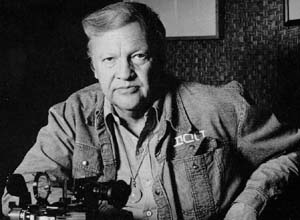
James Dickey (2 februari 1923 – 19 januari 1997)
De Maltese dichter Norbert Bugeja werd geboren in Siġġiewi op 2 februari 1980. Zie ook alle tags voor Norbert Bugeja op dit blog.
Uit: Clamouring to be read
“I am here as the guest writer for Malta, thanks to an excellent collaboration between the Malta Council for Culture and the Arts and the Embassy of Malta in Berlin. I will recite A Tango for the Stairs of Valletta, a lyrical triad that will feature in my upcoming collection, ‘Bliet’ (Cities), now kindly taken up by a major publisher. My first reading is at the bustling ‘Small Languages, Great Literatures’ stand. I read in Maltese, followed by a reading in German. Then I comment on my work. The audience is visibly captivated by the rhythms and sounds of Maltese. They inquire about the Mediterranean context in my poetry. Among them is Zvonko Makovic, one-time president of the Croatian PEN, and perhaps the greatest living Croatian poet. We nod at each other. I met Zvonko for the first time in 2005 at the Lodeve Poetry Festival, where he volunteered valuable comments about my writing. Zvonko is very keen on getting toknow the Maltese creative milieu. At a Croatian stand brimming with translated works I spot the novelist Roman Simic, who was in Malta some time ago on an LAF/Inizjamed collaboration. He pours me a glass of Dalmatian wine. I am introduced to two Cypriot authors: Yorgos Trillidis, who quips about our desire to “become” writers of fame, and the charming playwright Eurydike Pericleus-Papadopoulou. We see a stronger network of Mediterranean writers emerging, a generation clamouring to shed obscurity, to emerge from the shadows of the world’s “official” languages, to speak of regional and cultural spaces rather than of canons and of nations. Deep down, we all know what the pickle is.
We are imprisoned in the languages that contain our work, held up by the very tools that we use so deftly, hindered by the medium that nourishes us. Maltese is my national language as a Maltese citizen, and my gilded Alcatraz as a Maltese writer. The natural course of action for the Maltese writer today is to shun the shallowness of provincial rhetoric and patriotic discourse, to rebut the impulse of ramifying and wallowing in one’s own tradition, to spread one’s wings and fly into other languages. The fare will not be low-cost, but the destination is inexorable. “

Norbert Bugeja (Siġġiewi, 2 februari 1980)
Zie voor nog meer schrijvers van de 2e februari ook mijn vorige blog van vandaag.

